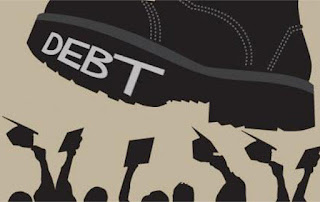A few days ago, Joe Biden announced a plan to reduce student debt. The Right went bonkers. It'll fuel inflation, they howled. Paul Krugman writes:
What you need to have is a sense of scale. If you’re worried about inflation, the relevant number here isn’t the eventual cost to taxpayers, which might be several hundred billion dollars. It is, rather, the effect on private spending. And I just don’t see any way to claim that this effect will be large.
Consider the fact that before the Covid pandemic — that is, before the government paused required payments on federally held student debt payments — total receipts from the federal loan program were about $70 billion a year. Since most student debt is in the form of large loans, much more than $10,000, these payments will be reduced by much less than that total. At most, then, we’re talking about tens of billions a year in a $25 trillion economy. That’s basically a rounding error.
Unable to convince people with the math, they then made a moral argument. Free money corrupts people. Krugman takes on that argument, too:
The right is inveighing against debt relief on moral grounds. “If you take out a loan, you pay it back. Period,” tweeted the House Judiciary G.O.P. On which planet? America has had regularized bankruptcy procedures, which take debt off the books, since the 19th century; the idea has been to give individuals and businesses with crippling debts a second chance.
And many people have taken advantage of those procedures. For example, businesses owned by a real estate mogul named Donald Trump filed for bankruptcy on six occasions. During the pandemic, many business owners received government loans that were subsequently forgiven.
Will this debt relief give many of these victims a second chance? To some extent, at least. There’s solid evidence that freeing former students from overhanging debt makes it easier for them to move to better jobs and increases their income. And since higher income will mean more future tax revenue, the true fiscal cost of debt relief will probably be less than the numbers you’re hearing.
But is this the best way to solve the problem?
As I said, the question is: Compared with what? Given the choice, I’d spend money on children rather than adults — and aid to families with children was, in fact, a big part of Biden’s original spending plans. But he couldn’t get those plans through Congress, while debt relief is something he can probably do through executive action.
And to Republicans whining that this plan does nothing for blue-collar Americans who didn’t go to college, a question: What are you proposing to do for such people — other than cut taxes on the rich and claim that the benefits will trickle down?
Once again, the Right has shown that it knows the cost of everything and the value of nothing.
Image:Current Affairs

6 comments:
"And to Republicans whining that this plan does nothing for blue-collar Americans who didn’t go to college", The fact is that most of the indebted kids are members of "blue collar workers who didn't go to college. They are the ones who try to put their kids through college in pursuit of a better future. These right wing yowlers haven't got a brain cell amongst them.
As my father used to say, zoombats, "If they had another brain it'd be lonely."
I'll throw another thought out for consideration. This probably is a more common occurrence in the US than Canada, but here goes..
How many universities are built and run by "Christian" organization money? Do these groups pay any taxes? I think the answer is a resounding "NO!!!!!" and yet their executives want to be paid millions (for the good life) and so fees are charged accordingly. It doesn't stop there: if "Christian" colleges and universities can pay top dollar for staff, then state run organizations have to match that in order to obtain the magical "best and brightest" both in educational staff as well as students.
Post secondary education (as well as private pre post secondary) has become the "go to" for many parents who want to get their kids the best opportunity going forward. This all costs huge dollars and I don't think that the voting public should assume that does NOT have tax implications for all of us.
Unfortunately, we have arrived at a time when it is not only important to be well educated, it has also become nearly as important as to what school did you go to and what friends (connections) did you make as a result. Competency in a particular field is not the only driving factor.
Universities have become brands, Lulymay, and the best bands are the most expensive.
Perhaps we are missing the point of ultra expensive post graduate education?
That we are missing in action! Doctors nurses and tradesmen/women and job openings remain unfulfilled poses the question ; is it too expensive to receive an education?
Education has been monetised,politicised and become the tool of religiosity.
Education is no longer the backbone of futuristic thinking!
Turning education back to it's roots will be difficult.
TB
Good points, TB. Education has been monetized for lots of people.
Post a Comment